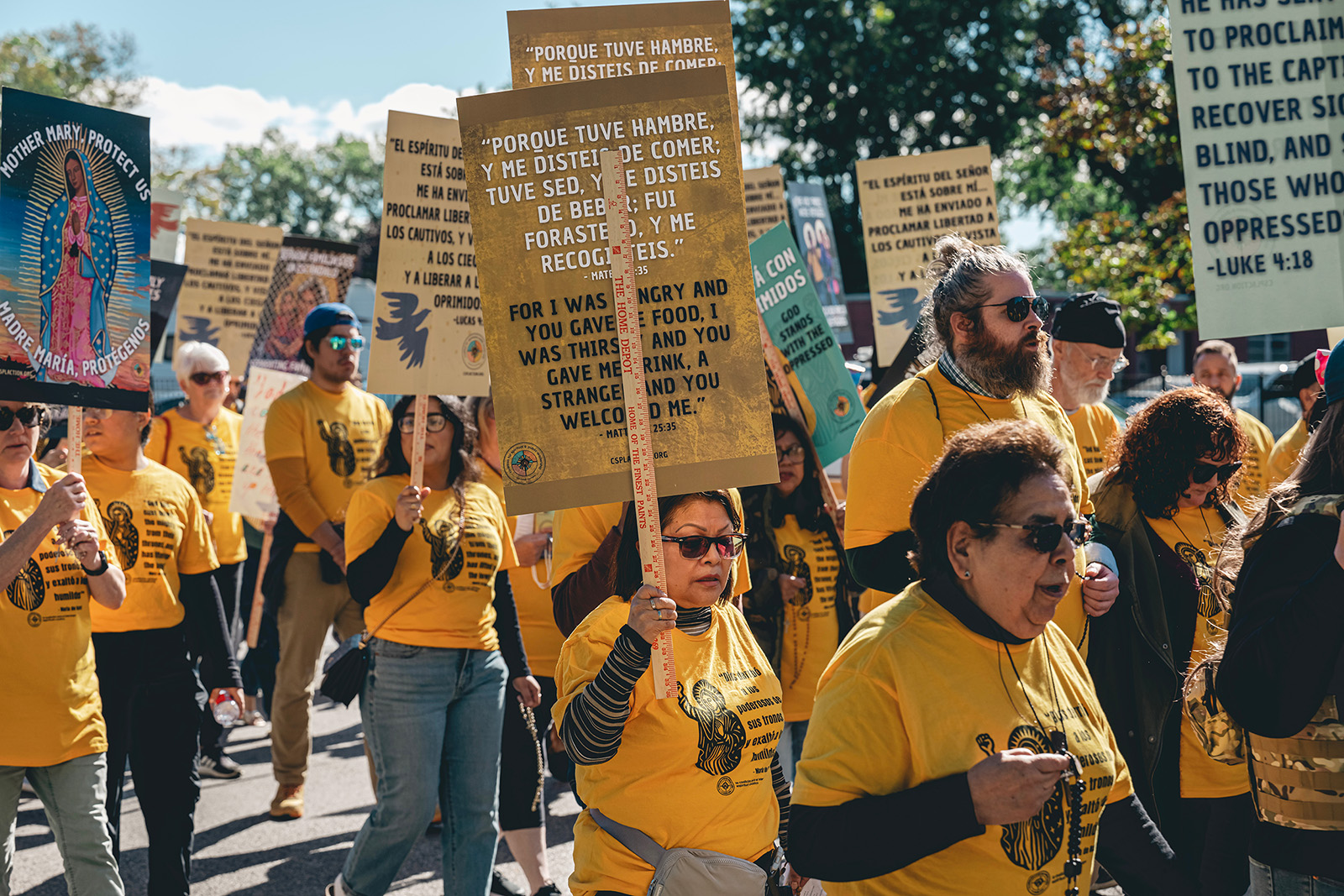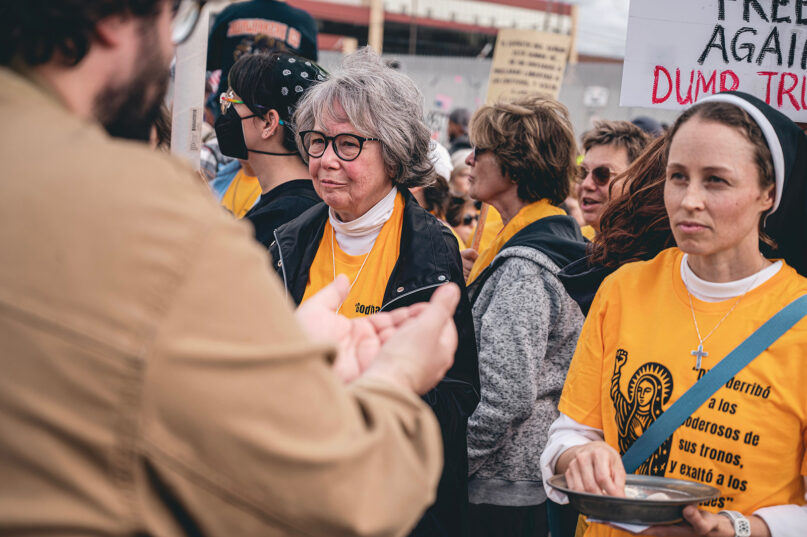
(RNS) — Pope Leo XIV told United States Catholic bishops last week that “the church cannot be silent” in the face of the Trump administration’s brutal mass deportation efforts. The day before, Leo published the first document of his pontificate, “Dilexi te,” in which he insisted the Catholic Church must assist “the least among us,” explicitly including vulnerable migrants because “the Church has always recognized in migrants a living presence of the Lord.”
The church was not silent Saturday (Oct. 11) near Chicago, as roughly 1,000 Roman Catholics processed in prayer, traveling a little more than a mile from a nearby Catholic parish to the U.S. Immigration and Customs Enforcement detention facility in Broadview, Illinois. They had hoped to send eight people into the facility to distribute Holy Communion. I spoke with several people who were there.
The procession was organized by the Coalition for Spiritual and Public Leadership, which is rooted in Roman Catholic faith and community organizing — both native flowers that bloom naturally in Chicago. Michael Okinczyc-Cruz, CSPL’s executive director, explained to me that CSPL discussed potential responses once the Trump administration announced Operation Midway Blitz, the federal government’s Chicago-area immigration crackdown last month. He said, “We discerned that we can bring Communion.”
One such example was holding a Mass on Sept. 13 outside the Naval Station Great Lakes in North Chicago, a military base serving as a staging spot for ICE agents, modeled after similar moments of resistance in Poland and El Salvador. Another was the Eucharistic procession on Saturday.
Bringing Communion in these ways is spiritually powerful among Roman Catholics, and it gives an extraordinary public witness. Roman Catholics believe that Jesus Christ really is present in the bread and the wine offered in the Eucharist. The implications are complex. DePaul University professor William T. Cavanaugh argued in a 1998 book that the Eucharist is a specific response to violence against human beings — the humanity of the suffering person is restored and affirmed by bringing the suffering of Jesus close in a way that is present.
There is another sense in which Jesus becomes present for Catholics. Scripture tells us that believers together are the body of Christ (1 Corinthians 12:12-27). When Catholics assemble for Mass, or when 1,000 Catholics march in prayer led by the Jesus present in the Eucharist, they bring the suffering of Jesus in bread and their bodies to the suffering of ICE detention.

A group organized by the Coalition for Spiritual and Public Leadership distributes Communion near the U.S. Immigration and Customs Enforcement facility in Broadview, Ill., Oct. 11, 2025. (Photo used with permission of the Coalition for Spiritual and Public Leadership)
Sister Christin Tomy, who was part of the procession, said: “To pair what is happening with the centrality of our Eucharistic identity was very powerful. It felt very much like ‘Become what you receive.’” And, she said, it came from “a deep respect for our call to be a Eucharistic people.”
Once the procession reached the detention facility, the Rev. Larry Dowling, a retired Chicago priest, told me that “there was no one, zero Homeland Security standing outside.” Only Illinois State Police greeted the procession. Department of Homeland Security officials would not speak directly with the procession or its leaders, and messages would need to be relayed through state police, he said.
As messages were sent back and forth to see whether procession representatives might be allowed into the facility to distribute Communion, Okinczyc-Cruz said the procession began spontaneously to sing “Pan de Vida,” which goes, ”We are the dwelling of God, fragile and wounded and weak. We are the body of Christ, called to be the compassion of God.”
Finally, a response came from ICE: an “unequivocal no, with no reason or justification,” Okinczyc-Cruz told me. “They denied our invitation to bring Christ into the detention center.”
Still, Sister Christin, Father Larry and others distributed Communion to the procession. The Rev. Dan Hartnett offered a prayer of spiritual communion for those inside the detention center. And, as peacefully as they came, the procession departed. They did not do all they went to Broadview to do, but accomplished a lot.
Spiritually, the reality of the church was present in a powerful way. God and God’s people came to bear witness and show care for the vulnerable, suffering people in detention who were separated from their lives, their loved ones and even from their rights as believers. Among believers, this is important.
But something more practical and political was learned, too, as Dowling drew an additional conclusion about ICE’s refusal to let clergy inside: “They are afraid of people of faith,” he said.
A few months ago, I wrote about how ICE was not honoring its own rules about granting detainees access to chaplains, pastoral care and religious services. Since then, and since Miami Archbishop Thomas Wenski shined light on the problem, people I know in an ICE facility have gotten access consistently to a priest. Pressure from religious groups works, but there will need to be more of it.
This means the church must continue to show up. As another person who was there Saturday told me, “Saturday was life-giving. I wish we could do it daily until they let them in to share the Eucharist.”
“Gaudium et spes,” the Second Vatican Council’s Pastoral Constitution on the Church in the Modern World, names “arbitrary imprisonment” and “deportation” alongside “murder, genocide, abortion [and] euthanasia” as “infamies” that “poison human society” and “are supreme dishonor to the Creator.” An apostolic constitution like this is one of the most authoritative ways the Roman Catholic Church teaches, all the more because “Gaudium et spes” was the fruit of an ecumenical council. The bishops of the world affirmed the text together with Pope John XXIII. This is not something Catholics can take lightly.
Still, some do. It is such a problem that Pope Leo wonders in Dilexi “why many people continue to think that they can safely disregard the poor” and vulnerable like migrants. Scripture and church teaching are so consistent that, seeming nearly to be shaking his head, Leo tells us perhaps some people need to “go back and re-read” them.
Often, the problem is a partisan commitment. We place our political party ahead of giving consistent witness to our faith. Sometimes we hear arguments about the right of the nation to secure its borders, as though migrants seeking safety or a better life are like a military invasion. Instead, we should know that “God intended the earth with everything contained in it for the use of all human beings and peoples,” as quoted in “Gaudium et spes.” God did not draw borders.
Some would urge us not to accompany the poor and the vulnerable because it could be dangerous. We do take risks when we oppose a regime that dehumanizes people created and loved by God. Our personal safety cannot always be guaranteed, even when Catholic leaders are doing the accompanying.
Yet the church must not be silent. Sometimes, it will not be safe. Sometimes we are called to take up our cross and follow (Matthew 16:24). That, too, is what it means to become what we receive.
(Steven P. Millies is the author of “Joseph Bernardin: Seeking Common Ground” and “A Consistent Ethic of Life: Navigating Catholic Engagement With U.S. Politics.” The views expressed in this commentary do not necessarily reflect those of Religion News Service.)
